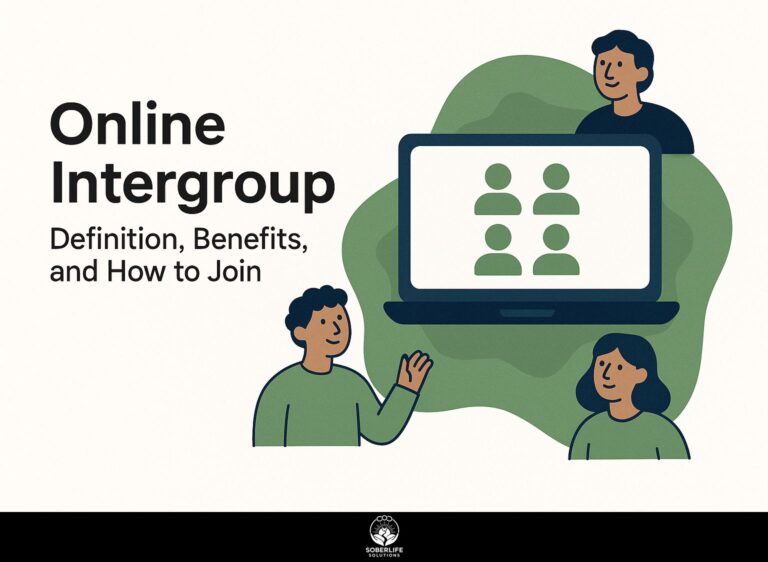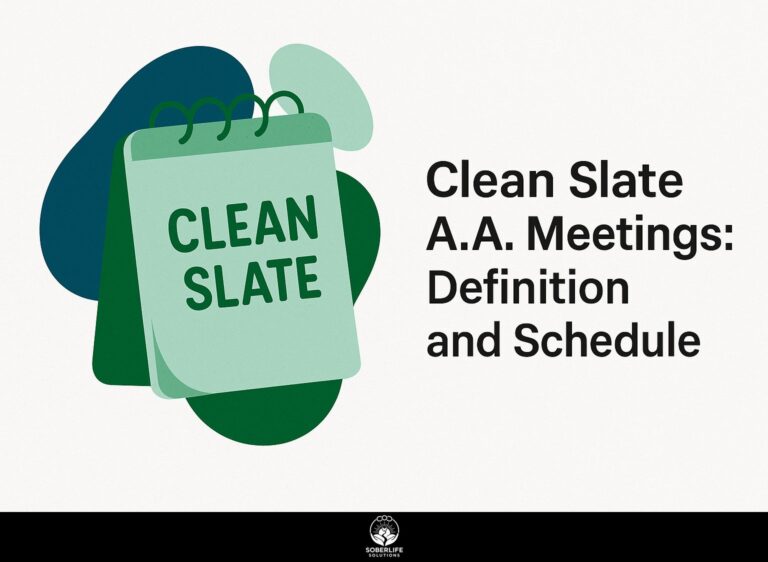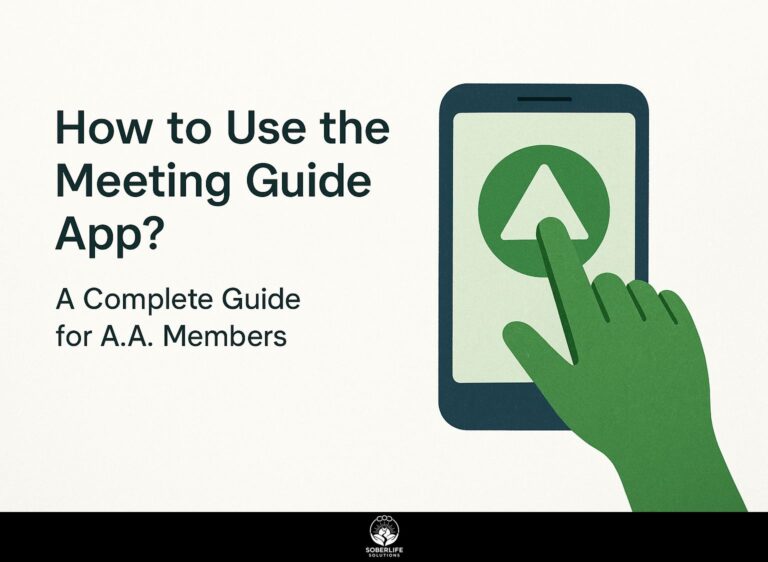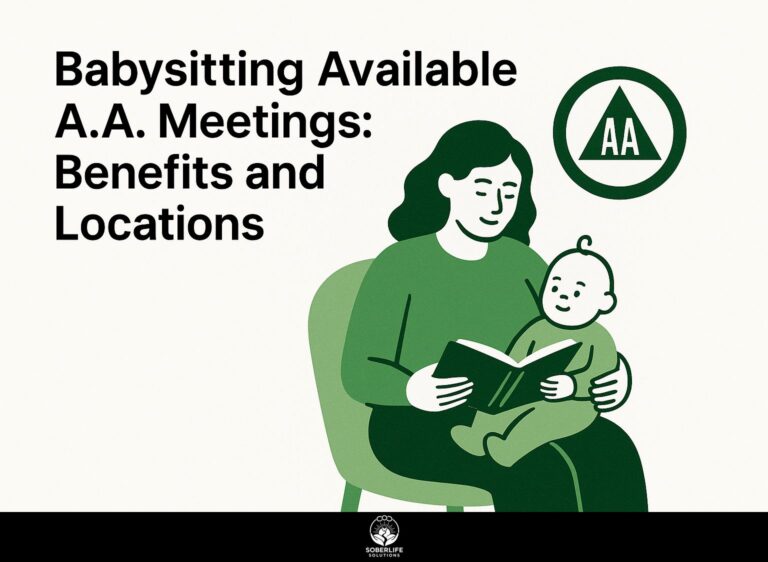11th Step Meditation Meetings: Purpose and Participation
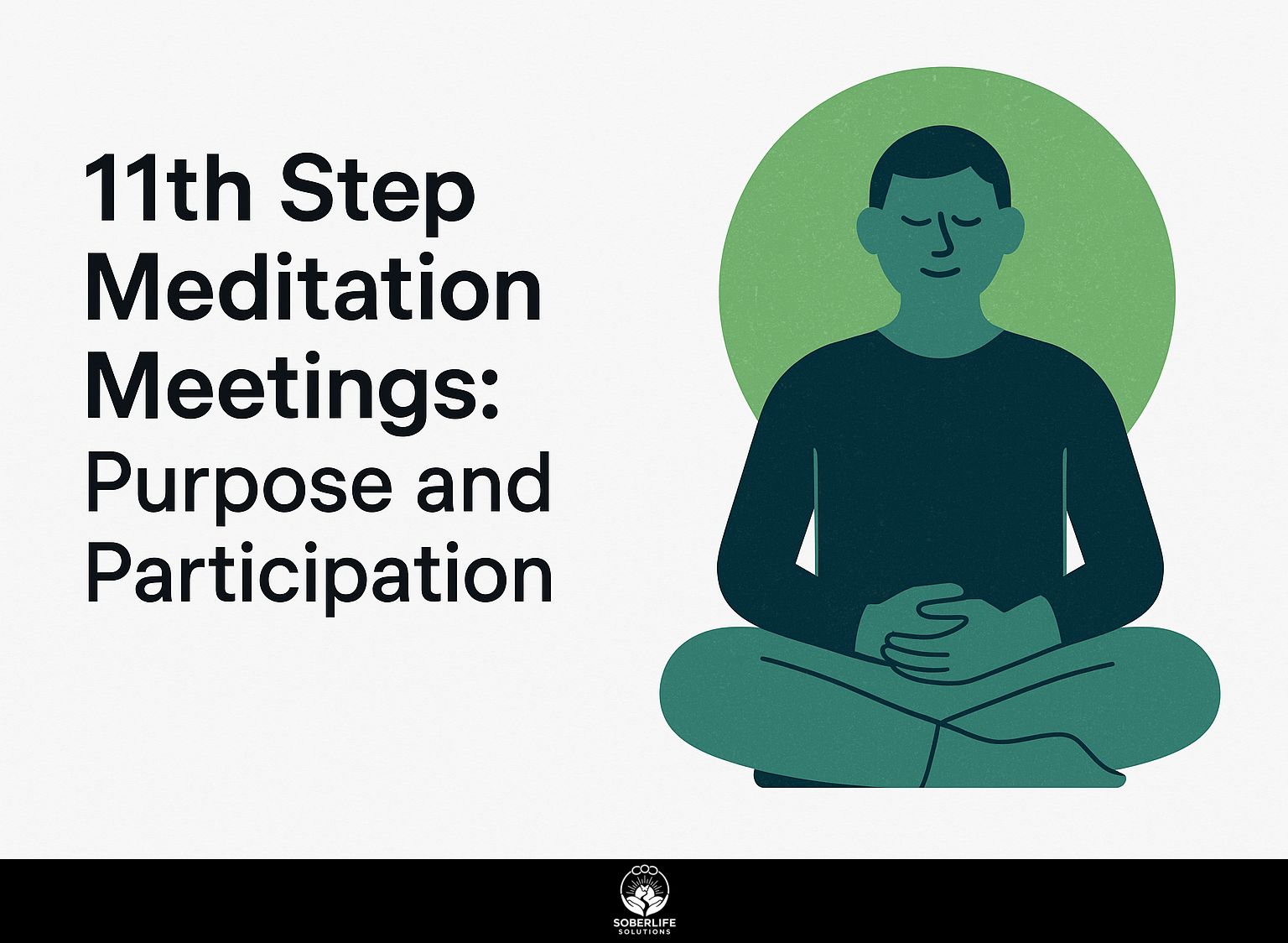
Experience the benefits of Step 11 through meditation meetings that encourage spiritual growth and connection with your higher power. Based on the teachings of Alcoholics Anonymous and influenced by people like St. Francis, these meetings use prayer and meditation to help you build a stronger relationship with God. This article will look at the purpose of 11th Step meditation meetings, how they are organized, and how you can join to improve your recovery process. Come along as we learn about this key aspect of spiritual development.
Key Takeaways:
Definition and Overview
The 11th Step in the Alcoholics Anonymous program focuses on meditation to improve one’s spiritual growth and connection with God.
This step encourages people to practice meditation and prayer daily to improve emotional stability and calmness.
Spending 10-15 minutes each morning sitting quietly can refresh your mind and help you become more alert. Many members also find value in guided meditation apps like Headspace or Calm, which provide structured approaches to centering thoughts.
Including nightly prayers can increase thankfulness and strengthen a bond with a higher power, helping with healing and personal development.
Historical Context
The practice of the 11th Step was inspired in part by the teachings of St. Francis and the Serenity Prayer, guiding members towards a deeper spiritual life.
This step promotes meditation and prayer as important parts of getting better. Key figures like Bill Wilson, co-founder of Alcoholics Anonymous, emphasized its importance in his writings.
The ‘Twelve and Twelve’ explains the 11th Step, emphasizing daily habits and thoughts that help maintain a relationship with a higher power. Members are encouraged to carve out dedicated time, often using tools like guided meditation apps or journaling.
Following these practices encourages awareness and spiritual development, important for staying sober and improving overall health, a sentiment echoed by NPR in their exploration of Alcoholics Anonymous’s history and influence.
Purpose of 11th Step Meditation Meetings
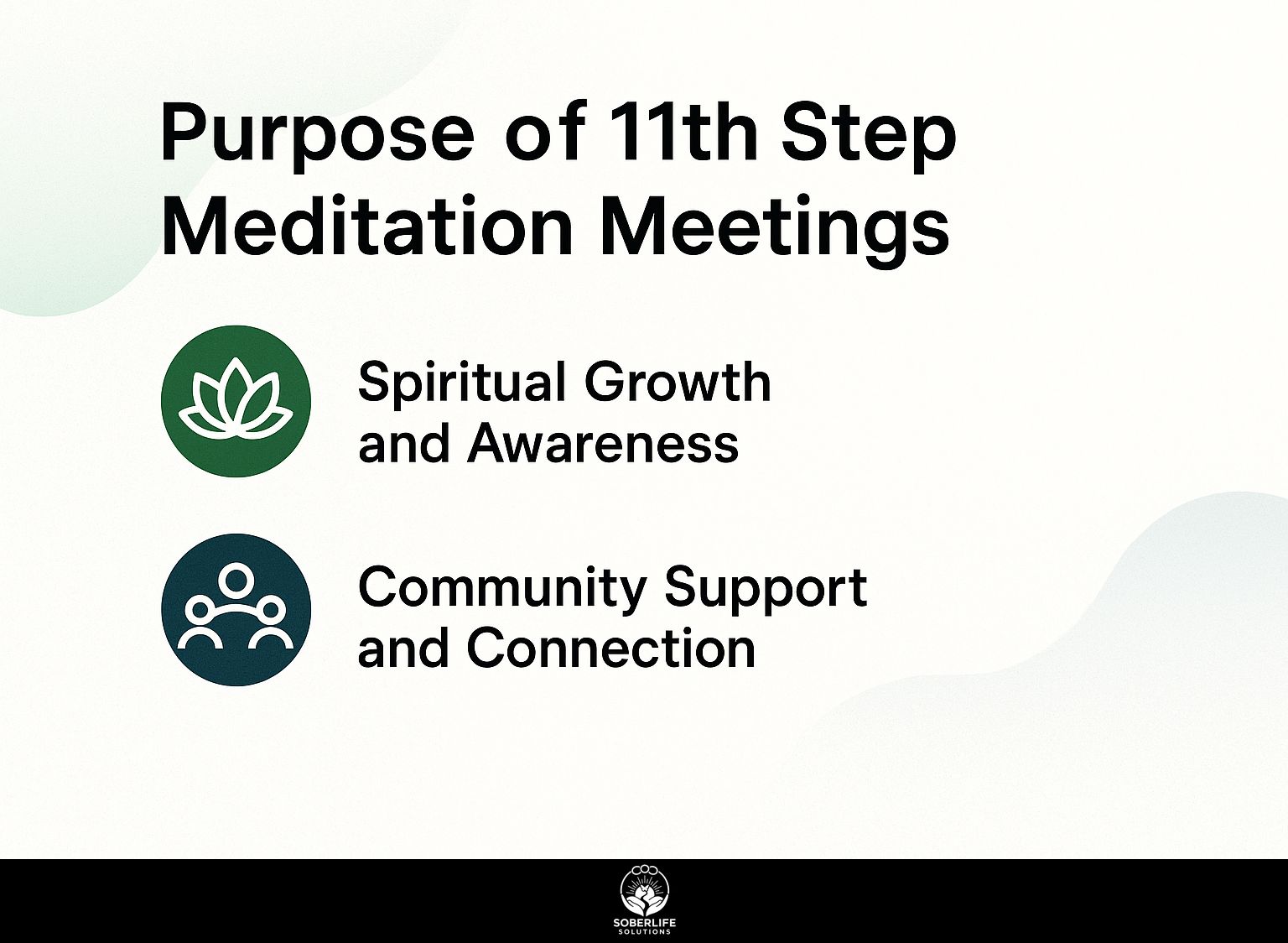
These meetings provide a structured setting for people to think about their personal connection with a higher power and build community support. To further explore how spiritual practices can enhance your journey, consider the insights shared in our comprehensive guide on Spiritual Health: Purpose and Meaning in Recovery.
Spiritual Growth and Awareness
Joining 11th Step Meditation meetings helps you grow spiritually by making you more aware of your current thoughts and feelings.
These meetings often include mindfulness meditation methods, helping individuals pay attention to their breathing and notice their thoughts without judging them.
Participants can take part in gratitude activities, where they think about things they appreciate in their lives to develop a positive attitude.
Guided meditations can make the experience better by giving you a clear method to understand your emotions. UCLA Health provides a range of guided meditations that can enhance these experiences by offering structured pathways to emotional understanding.
Tools like the Headspace app give easy instructions for beginners in meditation, helping to make these habits part of daily routines for better emotional balance. Related insight: Spiritual Practices: Role in Relapse Prevention explores how these methods can support long-term well-being.
Community Support and Connection
The communal aspect of 11th Step Meditation builds strong connections among members, enhancing feelings of belonging and support.
When members share personal stories during these meditations, they often feel relieved and connected, building stronger emotional ties.
For instance, discussing a recent struggle can shift focus from individual challenges to collective healing, allowing participants to feel less isolated.
Tools like group discussions and partner check-ins encourage accountability and emotional support. Engaging in these practices helps individuals forget their own worries temporarily, while reinforcing the importance of community in recovery.
This strengthened bond is very important for staying sober and supporting complete healing.
Structure of the Meetings
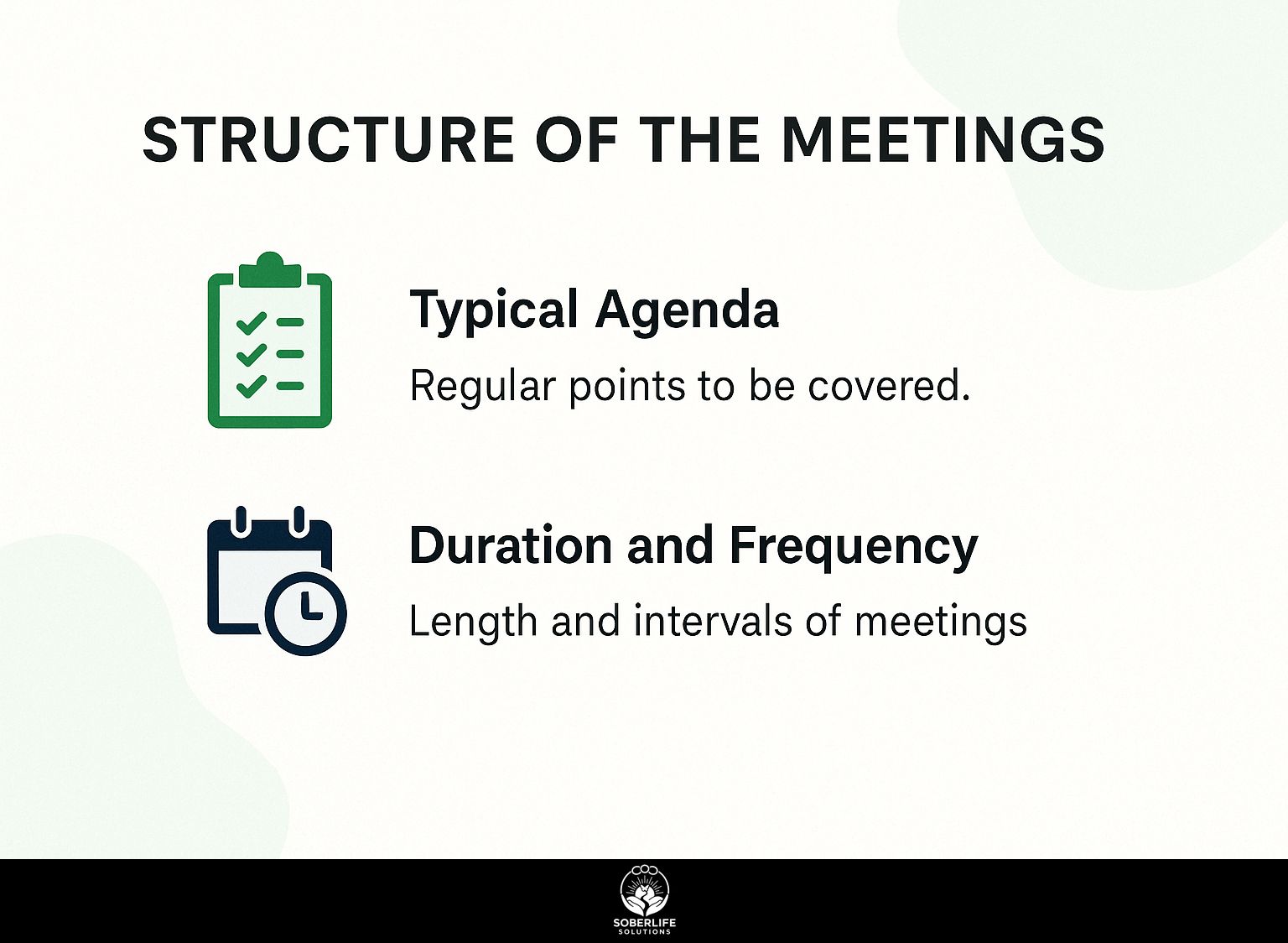
Meetings usually have a regular format that allows participants to take part in thoughtful meditation and sharing activities. To enhance these practices, explore the benefits of various techniques in our deep dive into mindfulness and meditation for addiction recovery.
Typical Agenda
A typical 11th Step meditation meeting might include a welcoming, a brief reading, a meditation session, and open sharing time.
To improve the experience, set aside specific time for each part. For example, spend the first 10 minutes on greetings and introductions to build a sense of community.
Follow this with a 5-minute reading from relevant literature, setting a contemplative tone. The meditation session can last 20 minutes, offering participants a dedicated space to reflect inwardly.
Set aside 15-20 minutes for members to share their thoughts and ideas openly. This structured approach maintains focus during the meeting and increases participation.
Duration and Frequency
Meetings are often held weekly and typically last between 60 to 90 minutes, offering a regular time for reflection and community interaction.
These gatherings can deepen participants’ spiritual practices by incorporating structured activities such as group prayer, guided meditation, or scriptural discussions.
For example, spending the first 20 minutes in quiet thought helps people find focus, and the next 40 minutes can be spent discussing ideas and group prayer.
Regular practice helps people connect with God and develop spiritually as they gain knowledge about their faith in a supportive environment, enhancing both individual and group experiences.
Participation Guidelines
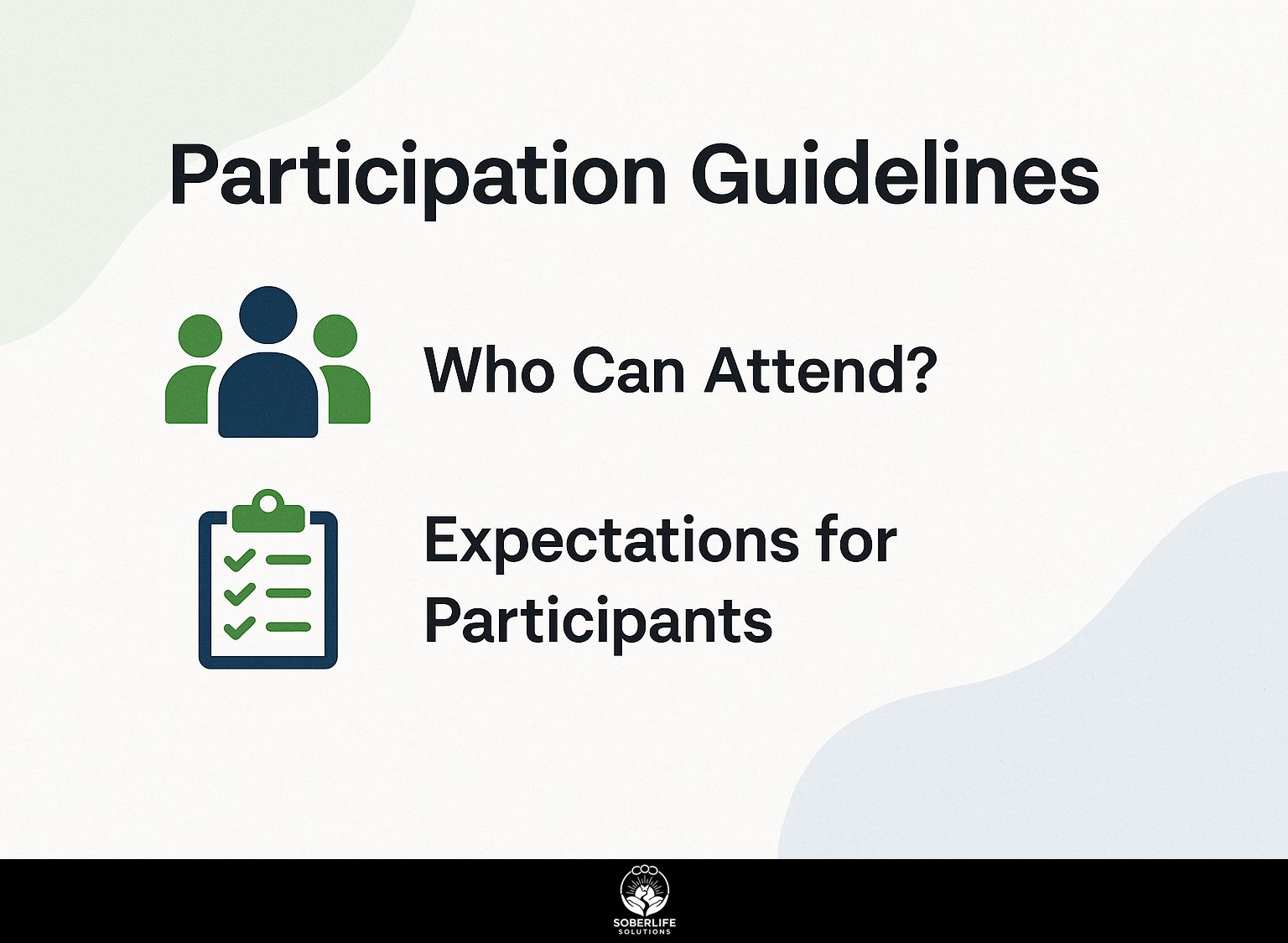
Anyone looking to grow spiritually, including people in recovery or those curious about meditation as a spiritual practice, can join. In particular, exploring the benefits of peer support groups can offer valuable insights into shared experiences and collective growth.
Who Can Attend?
These meetings are typically open to all A.A. members and anyone interested in exploring spiritual practices related to recovery.
Participants are encouraged to talk about their experiences, creating a welcoming place for people at any point in their recovery process, including those who are new.
The format often includes guided discussions on topics such as coping strategies, personal growth, and the role of spirituality in recovery.
Meetings often have materials like the Big Book or pamphlets to help with thought and learning.
Having a mentor can make someone’s experience better by providing personal support and holding them accountable as they work through their recovery process together.
Expectations for Participants
Participants should be polite and listen carefully, making sure everyone feels welcome.
To improve this setting, establish clear guidelines. Emphasize confidentiality, ensuring that personal stories remain shared only within the group.
To promote active listening, ask participants to repeat what others have said before replying. This helps build mutual respect.
Encourage everyone to speak up and share their opinions equally. Use an object that gives each person a chance to speak without interruptions.
These methods create a safe space and build a stronger sense of community, allowing participants to connect and relate to each other more deeply.
Benefits of Attending
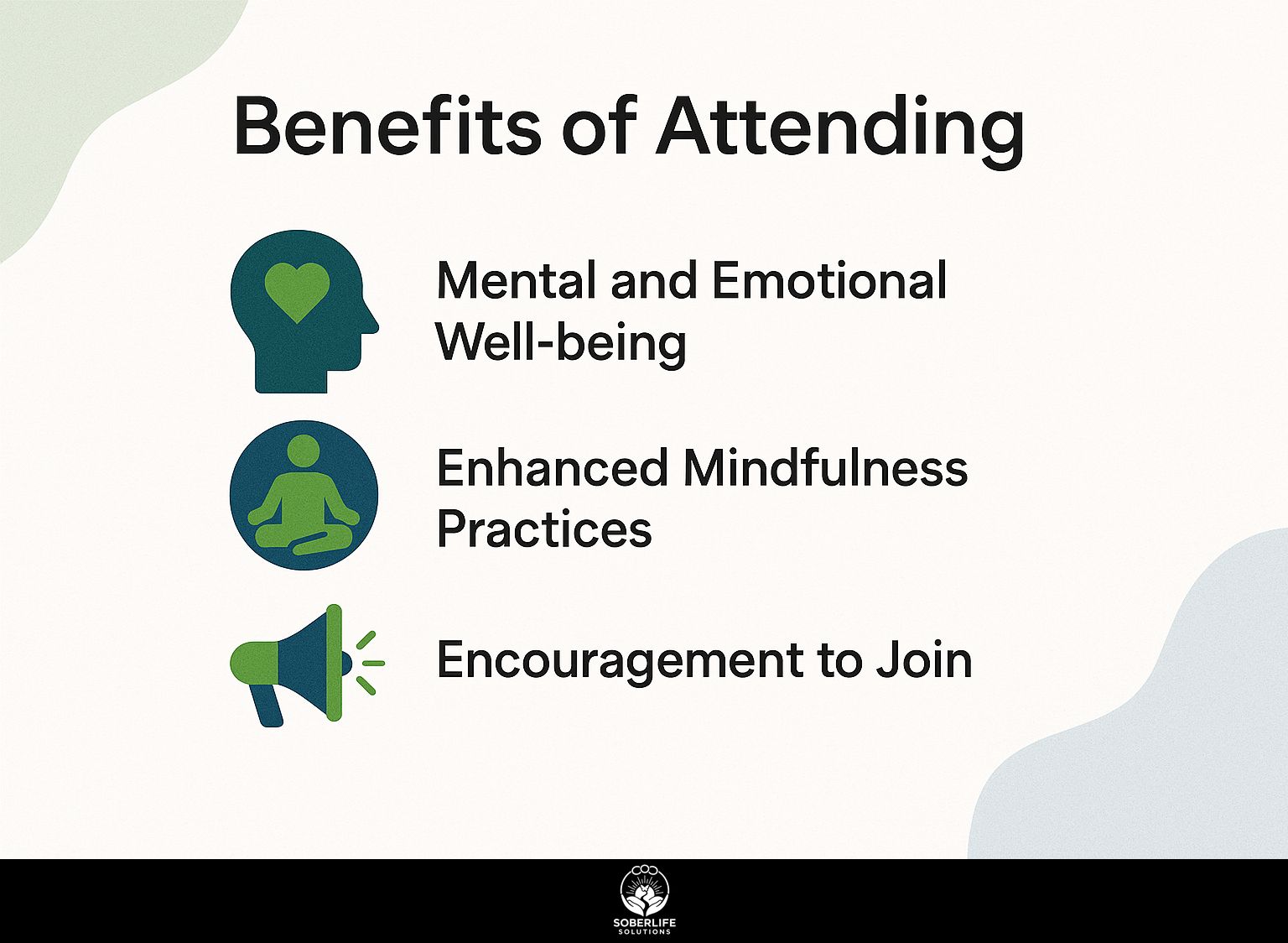
Going to 11th Step Meditation meetings regularly can greatly improve mental and emotional well-being, creating a feeling of calmness and tranquility. Worth exploring: Peer Support Groups: Definition, Benefits, and Activities to enhance your recovery journey.
Mental and Emotional Well-being
Practicing meditation can guide people to emotional stability and lower anxiety, promoting a sense of healing in their lives.
Research shows that consistent meditation can lower cortisol levels, which are associated with stress. A study published in the Journal of Health Psychology found that just 10 minutes of daily meditation significantly reduced anxiety symptoms over eight weeks. Additionally, a comprehensive review by JAMA Internal Medicine highlights the effectiveness of meditation programs in reducing psychological stress and improving overall well-being, further supporting these findings.
To begin, try using apps like Headspace or Calm, which provide guided sessions designed for beginners. Joining community groups or online forums can provide support and motivation, deepening your practice and enhancing the overall benefits.
Enhanced Mindfulness Practices
Attending meetings improves concentration, helping individuals stay more mindful and engaged in their daily tasks.
During these gatherings, individuals practice mindfulness techniques such as focused breathing and body scans, which can easily be integrated into daily routines.
For example, participants might engage in a five-minute breathing exercise before each meeting, promoting relaxation and focus.
Outside of meetings, members can adopt a simple meditation practice by dedicating 10 minutes daily to mindful breathing or observing thoughts without judgment.
Regularly following these practices increases awareness, lowers stress, and helps people handle life’s difficulties more calmly.
Encouragement to Join
Attending these meetings offers community support and helps strengthen spiritual practices, improving one’s recovery process.
One powerful element of 11th Step Meditation is sharing personal testimonies. Members often say the practice helps them feel calm and understand things better.
One person shared, “Meditation has changed my daily anxiety into calm focus, helping me stay present.” Another person highlighted the community aspect, saying, “Listening to others during meditation has increased my knowledge of peace.”
To improve your practice, try using tools such as a meditation app like Headspace or guided sessions on platforms like YouTube. These can help you meditate more effectively and connect with others.
Frequently Asked Questions
What is the purpose of 11th Step Meditation Meetings?
The purpose of 11th Step Meditation Meetings is to provide a space for individuals to deepen their spiritual practice through meditation and reflection. It’s also a way to meet others who want spiritual growth and help on their path.
Who can participate in 11th Step Meditation Meetings?
Anyone who is interested in incorporating meditation into their spiritual practice can participate in 11th Step Meditation Meetings. These meetings are open to people of all faiths and backgrounds.
Do I need to have experience with meditation to attend these meetings?
No, prior experience with meditation is not necessary. These meetings are open to beginners and experienced meditators alike. The focus is on the shared experience of spiritual growth and support, rather than individual skill level.
What can I expect at an 11th Step Meditation Meeting?
At these meetings, there will typically be a period of guided or silent meditation, followed by a discussion or sharing circle. The meetings may also include readings, prayers, or other spiritual practices.
Do I have to be a member of a specific 12-step program to attend these meetings?
11th Step Meditation Meetings welcome everyone interested in spiritual development and support, even if they aren’t part of a 12-step program. These meetings may be helpful for individuals in recovery, but they are not exclusive to those in recovery.
How can I find an 11th Step Meditation Meeting near me?
You can search online for local meetings or check with your local spiritual or community center. You can also ask individuals in your spiritual or recovery community for recommendations and information about 11th Step Meditation Meetings in your area.

